Em Português, Por Favor!
In Portuguese, Please!
Have you ever spoken to someone in Portuguese, only to have them immediately switch to English on you? The path...
Please request our permission before redistributing these files.
- Rúben: Boa tarde, em que posso ajudar? Rúben: Good afternoon, how can I help you?
- Joel: Boa tarde! Estou... Joel: Good afternoon! I'm...
- Rúben: Oh, I am sorry, sir. Rúben: Oh, I am sorry, sir.
- I can see you aren't Portuguese. I can see you aren't Portuguese.
- Joel: Sim, mas eu posso... Joel: Yes, but I can...
- Rúben: Let's start again. Rúben: Let's start again.
- Good afternoon, sir! Good afternoon, sir!
- How are you today? How are you today?
- Joel: Estou bem, obrigado. Joel: I'm fine, thanks.
- Estou à procura de um presente para a minha prima. I'm looking for a present for my cousin.
- Pode ajudar-me? Can you help me?
- Rúben: Yes, of course. Rúben: Yes, of course.
- What kind of present are we looking [for] today? What kind of present are we looking [for] today?
- Joel: Desculpe, o senhor fala português? Joel: Excuse me, do you speak Portuguese?
- Rúben: Yes, of course! Rúben: Yes, of course!
- I am Portuguese, of course I speak Portuguese. I am Portuguese, of course I speak Portuguese.
- Joel: Ótimo, porque eu também falo. Joel: Good, because I speak [it] too.
- Rúben: Ah, certo. Rúben: Oh, right.
- Eu peço desculpa. I apologize.
- Esta loja recebe muitos turistas, This store gets a lot of tourists,
- por isso eu estou habituado a falar em inglês! so I'm used to speaking in English!
- Joel: Não faz mal. Joel: It's okay.
- Sabe, às vezes, parece que os portugueses querem mostrar que falam inglês. You know, sometimes it seems that the Portuguese want to show that they speak English.
- Rúben: Ah, não. Nada disso. Rúben: Oh no. Not at all.
- É só porque somos muitos simpáticos e queremos ajudar. It's just that we're so nice and we want to help.
- Joel: Pois, talvez... Joel: Yeah, maybe...
- Rúben: O nosso inglês é very very nice, não é? Rúben: Our English is very very nice, isn't it?
- Joel: Sim, é bom. Joel: Yes, it's good.
- Quer dizer, normalmente, é melhor que o meu português. I mean, it's usually better than my Portuguese.
- Rúben: Sabe, é que os filmes americanos aqui em Portugal têm legendas, Rúben: You know, American films here in Portugal have subtitles,
- não são dobrados como lá na Espanha! they are not dubbed like back in Spain!
- Joel: Pois, já ouvi isso algumas vezes... Joel: Yeah, I've heard that a few times...
- Rúben: Então, em que posso ajudá-lo? Rúben: So, how can I help you?
- Joel: A minha prima gosta deste género de louça de cerâmica, Joel: My cousin likes this kind of ceramic dishware,
- mas eu não percebo muito disto. but I don't know much about it.
- Rúben: Bem, nós temos muitas peças de cerâmica bonitas. Rúben: Well, we have many beautiful ceramic pieces.
- Deixe-me mostrar-lhe algumas. Let me show you some.
- Joel: Obrigado. Joel: Thank you.
- Rúben: Here we have some bowls and... Rúben: Here we have some bowls and...
- Joel: Desculpe… Pode falar em português comigo, por favor? Joel: Excuse me... Can you speak to me in Portuguese, please?
- Rúben: Ah, I forgot! Rúben: Ah, I forgot!
- Quer dizer… Esqueci-me! I mean... I forgot!
- Mas tem certeza que entende este tipo de vocabulário? But are you sure you understand this kind of vocabulary?
- Joel: Bem, se não tentar nunca vou saber. Joel: Well, if I don't try I'll never know.
- Rúben: Pois é, tem razão. Rúben: Yes indeed, you're right.
- Joel: Desculpe se estou a ser insistente. Joel: I am sorry if I'm being pushy.
- Estou a aprender a língua e preciso de praticar. I'm learning the language and I need to practice.
- Consegue compreender-me? Can you understand me?
- Rúben: Sim, consigo. Rúben: Yes, I can.
- Fala muito bem! You speak very well!
- You almost don't have "pronounce". You almost don't have "pronounce".
- Joel: Pois, pronúncia. Joel: Right, pronunciation.
- Obrigado. Thank you.
- Bem, fale-me destas peças... mas em português. Well, tell me about these pieces... but in Portuguese.
- Rúben: Estas são muito populares. Rúben: These are very popular.
- A sua prima, gosta de cozinhar? Your cousin, does she like to cook?
- Joel: Gosta, mas às vezes eu penso que ela só gosta de colecionar coisas. Joel: She likes it, but sometimes I think she just likes to collect things.
- Rúben: I see. Rúben: I see.
- Que tal esta? How about this one?
- Joel: Sim, essa é muito linda. Joel: Yes, that one is very beautiful.
- Mas penso que é demasiado grande. But I think it's too big.
- Ela vive num apartamento pequeno. She lives in a small apartment.
- Rúben: Compreendo. Rúben: I understand.
- Aqui temos algumas que são mais pequenas. Here we have some that are smaller.
- Este jarro, por exemplo. This pitcher, for example.
- Joel: Pode repetir? Este...? Joel: Can you repeat that? This...?
- Rúben: You know… pitcher, jug. Rúben: You know... pitcher, jug.
- Joel: Mas como se diz “pitcher” em português? Joel: But how do you say "pitcher" in Portuguese?
- Rúben: Jaaaaa-rrrrrro. JA-RRO! Rúben: Piiiitcher. PI-TCHER!
- Joel: Jarro. Joel: Pitcher.
- Obrigado. Thank you.
- Eu sou estrangeiro, mas não sou surdo. I'm a foreigner, but I'm not deaf.
- Era só para repetir mais devagar. It was just to repeat [it] more slowly.
- Rúben: We also have a tray with the same design. Rúben: We also have a tray with the same design.
- Joel: Tem o quê? Joel: You have what?
- Rúben: Também temos uma bandeja com o mesmo estilo. Rúben: We also have a tray with the same design (style).
- Joel: Da bandeja também gosto, Joel: I like the tray too,
- mas hoje levo só o jarro. but today I'll just take the pitcher.
- Rúben: Perfeito. Rúben: Perfect.
- Vou embrulhá-lo. I'll wrap it up.
- Joel: Embrulhar? Joel: Wrap?
- Não entendi, pode explicar? I don't understand, can you explain?
- Rúben: Yes, vou em-bru-lhar. Rúben: Yes, I'm going to wr-ap [it].
- Fazer em-bru-lho. Do the wra-pping.
- Joel: Sim, mas o que significa? Joel: Yes, but what does it mean?
- Pode dizer-me um sinónimo? Can you tell me a synonym?
- Rúben: Ah, sure. Vou envolver o jarro em papel, Rúben: Ah, sure. I'll wrap the pitcher in paper,
- para ficar bonito e para ser uma surpresa. to make it look nice and to be a surprise.
- Joel: Obrigado pela explicação. Joel: Thanks for the explanation.
- Assim já entendi, e obrigado por me ajudar a praticar! Now I got it, and thanks for helping me practice!
- Rúben: Of course! It was my pleasure! Rúben: Of course! It was my pleasure!
- Joel: aclara a garganta Joel: *clears throat *
- Rúben: Com certeza! O prazer foi meu! Rúben: Of course! The pleasure was mine!
- Rui: Desculpe a minha insistência. Rui: Excuse my insistence.
- Estou a aprender a língua e preciso praticar. I'm learning the language and I need to practice.
- Joel: Desculpe a minha... Joel: Excuse my...
- ??? ???
- Desculpe a minha... Excuse my...
- in... insistência. in... insistence.
- Desculpe a minha... Excuse my...
- ??????????? ???????????
- ????????????? ?????????????
- ??????????????? ???????????????
- ????????????????? ?????????????????
- ??????????????????? ???????????????????
- ????????????????????? ?????????????????????
- Rui: I'll change that around... Rui: I'll change that around...
- Desculpe se estou a ser insistente. I'm sorry if I'm being pushy.
- Joel: Insistente... that's easier. Joel: Insistent... that's easier.
- Rui: Estou aprender a língua e preciso praticar. Rui: I'm learning the language and I need to practice.
- Joel: Desculpe se estou a ser insistente. Joel: I'm sorry if I'm being pushy.
- Estou aprender a língua e preciso de praticar. I'm learning the language and I need to practice.
- Rúben: Jaaaaa-rrrrrro. JA-RRO! Rúben: Piiiiiitcher. PI-TCHER!
Vocabulary
a bandejatray a cerâmicaCeramic as coisasthings colecionarto collect devagarslowly dobradosdubbed, doubled, folded, bent masc.,pl. embrulharto wrap estilostyle, design EstrangeiroForeigner ExplicaçãoExplanation HabituadoUsed to InsistenteInsistent, pushy o jarropitcher, jug as legendassubtitles, captions lindabeautiful a lojastore LouçaDishes, dishware mostrarto show as peçaspieces a primafemale cousin pronúnciapronunciation receberto receive, get saberto know facts simpáticosnice, friendly masc. pl. SurdoDeaf TalvezMaybe tentarto try os turistasthe tourists ÓtimoGreat Expressions
Pode repetir?Can yousing.,formal repeat that? Por issoSo, Therefore O que significa?What does it mean? Nada dissoNot at all Não faz malNo problem, That's okay, No harm done Que tal esta?How about this one? O senhor fala português?Do you speak Portuguese? (formal, speaking to man) Quer dizer...I mean... Como se diz ... em português?How do you say... in Portuguese? às vezessometimes Tem razãoYou're right sing.,formal Não é?Isn't it?, Right? Já entendiI got it, I understood  Joel
Joel Rui
Rui


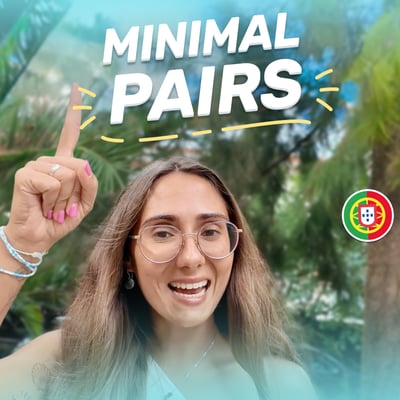
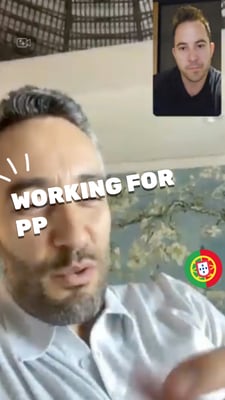
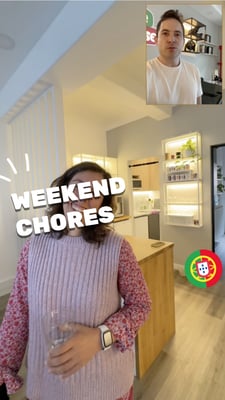
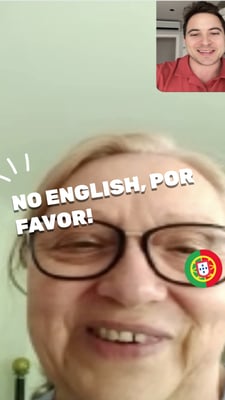
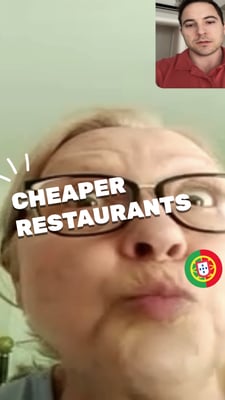
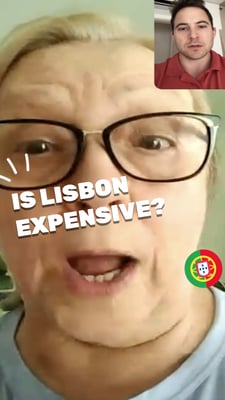
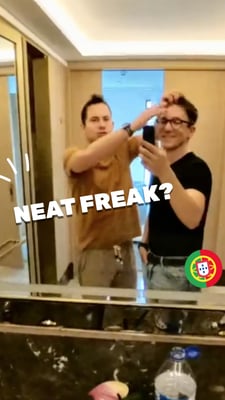


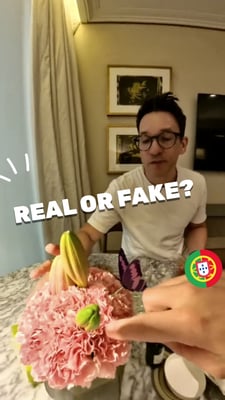
Muito obrigada
Odoro esta tipologia de vídeos! Achas que vais fazer mais destes no futuro?
Olá Giulia! Ainda bem que adoras estes vídeos, obrigado pelo comentário. Mais destes no futuro? Esperemos que sim 🙂
In the above story, Joel says, “Estou á procura de um presente…” What is the difference if you were to say, “Estou a procurar um presente…” using the present continuous form?
Thanks,
Rob
You could say Estou a procurar as an alternative to Estou à procura, but it would just be less idiomatic. Both are correct, the difference being that procurar is a verb, while procura is a noun.
So this would be a more literal translation of each one:
Estou a procurar um presente = I am looking for a present
Estou à procura de um presente = I am in search of a present
Não percebi bem, o senhor disse “jarro”? Um video muito engraçado, espero que façam mais destes!